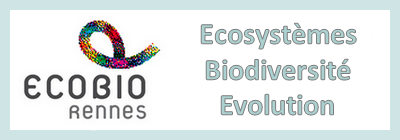Gene network simulations provide testable predictions for the molecular domestication syndrome
Résumé
The domestication of plant species lead to repeatable morphological evolution, often referred to as the phenotypic domestication syndrome. Domestication is also associated with important genomic changes, such as the loss of genetic diversity compared to adequately large wild populations, and modifications of gene expression patterns. Here, we explored theoretically the effect of a domestication-like scenario on the evolution of gene regulatory networks. We ran population genetics simulations in which individuals were featured by their genotype (an interaction matrix encoding a gene regulatory network) and their gene expressions, representing the phenotypic level. Our domestication scenario included a population bottleneck and a selection switch mimicking human-mediated directional and canalizing selection, i.e., change in the optimal gene expression level and selection towards more stable expression across environments. We showed that domestication profoundly alters genetic architectures. Based on four examples of plant domestication scenarios, our simulations predict (i) a drop in neutral allelic diversity, (ii) a change in gene expression variance that depends upon the domestication scenario, (iii) transient maladaptive plasticity, (iv) a deep rewiring of the gene regulatory networks, with a trend towards gain of regulatory interactions, and (v) a global increase in the genetic correlations among gene expressions, with a loss of modularity in the resulting coexpression patterns and in the underlying networks. We provide empirically testable predictions on the differences of genetic architectures between wild and domesticated forms. The characterization of such systematic evolutionary changes in the genetic architecture of traits contributes to define a molecular domestication syndrome.
Fichier principal
 Burban et al - 2021 - Gene network simulations provide testable predictions_Final.pdf (495.98 Ko)
Télécharger le fichier
Burban_sup_mat.pdf (1.19 Mo)
Télécharger le fichier
Burban et al - 2021 - Gene network simulations provide testable predictions_Final.pdf (495.98 Ko)
Télécharger le fichier
Burban_sup_mat.pdf (1.19 Mo)
Télécharger le fichier
Origine : Fichiers produits par l'(les) auteur(s)
